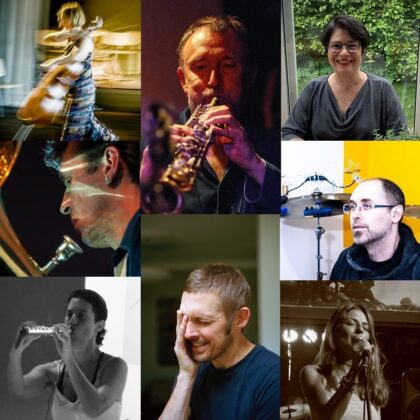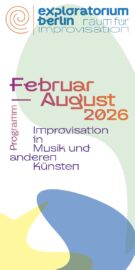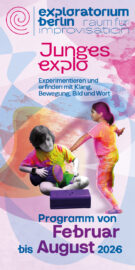Symposium: Musicians’ Perspectives on Improvisation
“Artists are the best explainers and models of what they do. Their views, reflections and contemplations are closer to the truth and more authentic than any other view concerning the music-objects they create.” (Wadada Leo Smith)
Viele der theoretischen Beiträge und wesentlichen Gedanken über Improvisation der letzten Jahre und Jahrzehnte entsprangen der Feder der Praktiker*innen selbst. Wie Wadada Leo Smith ging auch Derek Bailey in seinem wegweisenden, 1980 veröffentlichten Buch Improvisation. Its Nature and Practice in Music entscheidend davon aus, dass die Musiker*innen selbst die überzeugendsten Gewährsleute ihrer Kunst seien. Sein Ausgangsgedanke in diesem frühen Zeugnis künstlerischer Selbstauskunft war es, „die bedeutung der Improvisation anhand der Erfahrungen derer aufzuzeigen, die sie ausüben“.
Damit folgte er seiner Vermutung, dass „es einen wesentlichen Aspekt des Improvisierens gibt, der nicht ohne weiteres in den Resultaten zum Vorschein kommt oder völlig in ihnen aufgeht: ein Aspekt, den vielleicht nur die Ausübenden selbst richtig einschätzen und beurteilen können“.
Diese Haltung macht sich das exploratorium berlin als Ausgangpunkt zu eigen und fragt mit der Ausrichtung der Konferenz Musicians‘ Perspectives on Improvisation nach den spezifischen Praktiken, Ideen, Visionen und Theorien improvisierender Musiker*innen und anderer Improvisationskünstler*innen. Ihre Stimmen sind unerlässlich, um die Tiefe, Komplexität und Vielfalt der Praxis des Improvisierens zu verstehen. Ziel ist es, nochmals mit Derek Bailey gesprochen, „sich eine sinnvolle Auseinandersetzung mit Improvisation nicht anders als von einem praxisbezogenen, persönlichen Standpunkt vor[zu]stellen“. Adressiert sind damit zum einen die improvisierenden Musiker*innen und Künstler*innen selbst, um aus ihrer jeweils eigenen Perspektive Schlaglichter auf Aspekte des Improvisierens zu werfen, die für sie von entscheidender Relevanz sind. Zum anderen sind ebenso Wissenschaftler*innen eingeladen, ihre Sicht auf Aussagen von Praktizierenden über Improvisation darzustellen und ihren Diskurs dazu zu analysieren.
Beiträge:
Ulrike Brand: Chance and Unpredictability in Improvisation
John Butcher: There’s a whole world out there.
Marina Cyrino: flutist-body-flute: a relationship guided by vulnerability to the other as a living presence
Corinna Eikmeier: The Meaning of Improvisation
Silvana Figueroa-Dreher: A Sociological Model of Improvisation Processes based on Musicians’ Explanations
Tim Fletcher: Residuals – Exploring the Derek Bailey Archive
Birgitta Flick: Pulsations: Exploring the Interaction of Improvisation and Notation with the Means of Artistic Research
Jean-Charles François: The Empty-Full or Full-Empty of Artistic Research on Musical Improvisation
Zeynep Ayşe Hatipoğlu: Collaborative Improvisation as a Play: Practice-Based Research, from Istanbul in 2021 to the Present and Beyond
Olaf Hochherz: # Instruments/Tools
Carl Ludwig Hübsch: Do nothing?
Diego Kohn: Beyond the Normative: Non-European Improvising Musicians in European Cities
Matthias Koole: Improvisation and its Materiality
Una MacGlone: Diversifying Improvisation
Luigi Marino: Focus on Relationships: There Is More than what Meets the Eye.
Mattin & David Grundy: Freedom and Improvisation Today
mcddavid: The Art of Subjective Camera in Private Fairytales
Henry McPherson: Where in the World is the Improviser?: Transdisciplinarity, Ecology, and New Ways of Dreaming in Contemporary Free Improvisation Practice
Dag Magnus Narvesen: Flowing Decisions
Tam Thi Pham: Tradition and Improvisation
Federico Reuben & Franziska Schroeder: Improvised Rave
Simon Rose: Introducing: Relational Improvisation. Music, Dance and Contemporary Art
Wolfgang Schliemann: Invitation to Controversy: In what Way Is Improvisation Political and which Political Aspects of Improvisation Are Relevant today?
Richard Scott: The Songs of Others, Improvisation and Identity
Roman Stolyar: Bailey, Stockhausen, Braxton. Three Structural Approaches to Free Improvisation
Sabine Vogel: Trees, Traces and Roots
Altin Volaj: Cultural Crossroads: Free Improvisation’s Dialogue with Folk Music Heritage
Mark Wastell: DEREK BAILEY: An Afternoon at Sound 323
Georg Wissel: Ephemeral Kinetic Sculpture of Thoughts
Ebru Yazıcı: Sensing Sound: The Art of Improvisation
Dokumentation & Livestream: Einige der Beiträge werden per Livestream auf unserer YouTube-Seite übertragen; andere werden dokumentiert und später ebenfalls auf YouTube zugänglich gemacht:
https://www.youtube.com/exploratoriumberlin
Eröffnung: Zur Eröffnung des Symposiums ist das Trio John Butcher/Mark Wastell/Luigi Marino am 2. Februar um 20.00 Uhr in der Reihe Sound & Lecture im exploratorium zu Gast. Alle drei kommen aus der Praxis und haben durch Artikel, Buchveröffentlichungen, Plattenproduktionen oder Dissertationen einen bemerkenswerten Beitrag zum Nachdenken über Improvisation geleistet. Sie treten als Trio auf und diskutieren ihre spezifischen Auffassungen von Improvisation.
Zeiten
Freitag, 2. Februar 2024, 20:00 Uhr: Auftakt-Event „Sound & Lecture mit John Butcher/ Luigi Marino / Mark Wastell“
Samstag, 3. Februar 2024, 10:00–21:30 Uhr (einschließlich Offener Bühne)
Sonntag, 4. Februar 2024, 10:30–15:30 Uhr
Tagungssprache: Englisch
Kontakt und Information: Mathias Maschat – exploratorium berlin, Zossener Straße 24, D–10961 Berlin-Kreuzberg – Tel. 0049 / 178 / 554 87 42, mm@exploratorium-berlin.de
Dokumentation:
Samstag, 3. Februar 2024, 10:00–13:00 Uhr
Mathias Maschat (exploratorium berlin): Welcome Address
Mark Wastell: DEREK BAILEY: An Afternoon at Sound 323
Tim Fletcher: Residuals – Exploring the Derek Bailey Archive
Roman Stolyar: Bailey, Stockhausen, Braxton. Three Structural Approaches to Free Improvisation
Samstag, 3. Februar 2024, 14:30–15:45 Uhr
Ebru Yazıcı: Sensing Sound: The Art of Improvisation
Silvana Figueroa-Dreher: A Sociological Model of Improvisation Processes based on Musicians’ Explanations
Samstag, 3. Februar 2024, 16:00–17:00 Uhr
John Butcher: There’s a whole world out there.
Samstag, 3. Februar 2024, 19:00–20:30 Uhr
Zeynep Ayşe Hatipoğlu (featuring Ufuk Elik): Collaborative Improvisation as a Play: Practice-Based Research, from Istanbul in 2021 to the Present and Beyond [Wir bitten den fehlenden Anfang zu entschuldigen.]
Federico Reuben & Franziska Schroeder: Improvised Rave
Sonntag, 4. Februar 2024, 10:30–12:45 Uhr
Luigi Marino: Focus on Relationships: There Is More than what Meets the Eye.
Marina Cyrino: flutist-body-flute: a relationship guided by vulnerability to the other as a living presence
Ulrike Brand: Chance and Unpredictability in Improvisation
Sonntag, 4. Februar 2024, 13:45–15:30 Uhr
Una MacGlone: Diversifying Improvisation [Wir bitten den fehlenden Anfang zu entschuldigen.]
Carl Ludwig Hübsch: Do nothing?
Richard Scott: The Songs of Others, Improvisation and Identity


